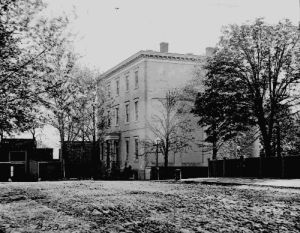Benjamin Franklin Moody, recovering from a fever and diphtheria, is passing the time in the Soldiers Home, Richmond, Virginia, where he helps nurse others as needed. In the midst of helping fellow soldiers, Private Moody takes time to compose a heart-felt letter to his wife and child.
“It is with pleasure that I seat myself to drop you a few lines to let you know that I am well at this time, hoping when this comes to hand it may find you enjoying the same blessing of God. I have been very sick, but I think that I am as well as ever, only I am weak yet. And I hope that I shall enjoy good health, as I have taken a great deal of medicine. I have had the very best of attention. There is one lady here that I never can forget in (my) life. I feel that I owe my life to her almost. Her name is Mrs. Page. I want you to remember her in your prayers.”
This woman, in all likelihood, is from Richmond’s First Baptist Church, as that congregation has been sending merciful helpers to the home. Their commitment to that task is evidently deep, for only those with strong resolve can bear the daily agony and grief already pervasive in the land. Although the war is yet young, the men and their nurses have all seen plenty. Moody reveals the depth of his endurance and depression to his wife, saturating the pages with descriptions of sadness and thereby purging his soul of pain.
“I want to see you the worst of all things but one: that is the end of the war. If I could see you I could tell you all about what I have seen. I have seen more suffering here than ever I saw before in my life. Their sickness seems to be the hardest to get over that ever I saw. It seems to be the most fatal. Men dies here like sheep with the rot. We have lost five of our company and more sick. I am with Isaiah today. He is getting well. I have not had a night’s sleep in over a week. I have had the care of John Jackson and Berry Diggs both and have (given) then medicine every two hours day and night. They have been very low.”
Jackson has an ugly infectious skin affliction and Diggs is bedridden with typhoid fever. Nevertheless, Moody hopes both will live.
Besides nursing the sick, Moody has been reading and thinking:
“I have read from the first of Acts and ninety nine pages of history since last Thursday morning. I try to live prayerful and thankful of my duty. I want you to think of me in your prayers. I know that we are in the hands of the Lord and He can deal with us as He sees proper. And I want us to be resigned to his will (even) if it is His will that we never see another again. I want to meet you in a better world where all wars will be won, where pain will be felt no more, where Christ sets on the right hand of the Father and liveth to make intentions for the saints.”
Though the Confederate soldier writes of his Christian commitment, he does not speak of church affiliation. Nor does he speak much of the location of home. Regardless of his denominational affiliation, Private Moody and his fellow soldiers are appreciative of the ministrations of the ladies of First Baptist Church Richmond.
Research tells us Moody and his fellow soldiers numbered among the four score or so in Company E, 35th Georgia Infantry Regiment, also known as the Campbell Volunteers. Gathered in Campbell County on 12 August 1861, this company was one of ten regimental units from a scattering of counties across the top half of Georgia.
Moody was born on 2 June either 1827 or 1829 and married Martha Jane Neill on 24 October 1850 in Coweta County. The couple has four children, Robert Neal, born in 1851; Nancy Camilla, born in 1853; Elizabeth A. (Lizzie), born 1856; and the baby, Daniel Toombs, born 1858. In his letter, Benjamin addresses each child. He instructs Robert to be “a good boy and be smart and get your wheat sowed” and “when you start to school try to learn fast and see how much you know when I come home.” He also asks Robert to help “Mr. Lee” and to be good to his sisters. Benjamin Moody’s own lack of education shows through his poor grammar and spelling, particularly as he addresses his daughter Camilla as “Comelar.” Spelling aside, he wishes the best for his oldest daughter. He admonishes Camilla to “be a good girl” and then makes her laugh as he says “help your Mother to cook a chicken pie and eat it for me. And I want you to eat some backbone and spare ribs for me.” In addressing Lizzie, Moody places importance on studying and also says, “run and play and sleep and think of me.” Lastly he speaks to young Daniel, “my baby,” urging him to be “as smart as you can” and not to cry for his dad “for I am coming home sometime.”
Possibly the lonely soldier never sees his family again, for Moody dies seven months later on 26 June 1862 at Mechanicsville, Virginia. His last letter home is dated 22 June. But for now, Moody, like many soldiers far from home, is pondering thankful thoughts and wishing to be with those he loves.
Sources: John J. Fox III, Red Clay to Richmond Train of the 35th Georgia Infantry Regiment, C.S.A., 2-6, 13; Mills Lane, “’Dear Mother: Don’t grieve about me. If I get killed, I’ll only be dead.’ Letters from Georgia Soldiers in the Civil War,” 87-88; Ancestry.com.
Story written by Arlette Copeland, Special Collections Assistant, Jack Tarver Library Special Collections, Mercer University, Macon, GA



